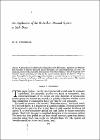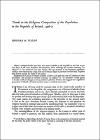Browsing The Economic and Social Review, Vol. 06, No. 4, 1975 by Title
Now showing items 1-7 of 7
-
Application of Rotterdam demand system to Irish data
(Economic & Social Studies, Dublin, 1975)A demand model which works in logarithmic first differences is applied to data from the Irish economy to estimate price and income elasticities. Six commodity-groups are used. The results are, on the whole, reasonable and ... -
Leontief paradox and United Kingdom patterns of trade in manufactures
(Economic & Social Studies, Dublin, 1975)The Heckscher-Ohlin model is concerned mainly with the causes and structure of international trade. According to this model trade arises because countries possess factors of production in different proportions. This leads ... -
Short-run employment functions for Irish manufacturing
(Economic & Social Studies, Dublin, 1975)Cyclical fluctuations in employment are a major concern of policy makers. When an industry's output changes, the level of employment also changes - but usually only with a time lag. Sensible policy and economic planning ... -
Simple approach to production functions via factor costs
(Economic & Social Studies, Dublin, 1975)Some common ground between input-output accounting and Cobb-Douglas (C.D.) production functions is explored. The problem of how to express value added as a function of labour, capital stock and time, is re-stated. For a ... -
Technical change in Northern Ireland manufacturing 1950-1968 - comment
(Economic & Social Studies, Dublin, 1975)Recently in this Review, McCulIough (1974) has presented a useful and interesting analysis of technical change in Northern Ireland manufacturing during the period 1950-1968. A major part of his analysis consisted of ... -
Trends in religious composition of population in Republic of Ireland 1946-71
(Economic & Social Studies, Dublin, 1975)Compared with 1946 there were more Catholics in the Republic in 1971 but 24 per cent fewer in the main Protestant denominations. More strikingly the number returning 'no religion' or 'no statement' has risen sharply. The ... -
Variables controlling elicitation and suppression of subvocal defence mechanism
(Economic & Social Studies, Dublin, 1975)A persuasive, counter-attitudinal communication was individually delivered to 66 male respondents. While the baseline control group (N = 12) merely received the message, the 54 experimental subjects responded to concurrently ...










